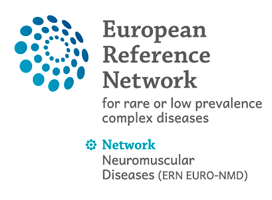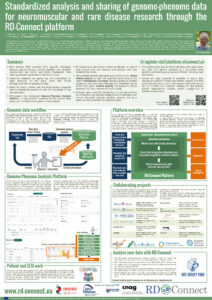30 Nov 2017
Standardized analysis and sharing of genome-phenome data for neuromuscular and rare disease research through the RD-Connect platform

Authors:
Dorota Badowska (Dorota.Badowska@newcastle.ac.uk), S. Beltran1,2, D. Piscia1,2, S. Laurie1,2, J. Protasio1,2, A. Papakonstantinou1,2, A. Cañada3,14, J.M. Fernández3,14, M. Thompson6, R. Kaliyaperumal6, S. Lair7, P. Sernadela8, M. Girdea9, M. Brudno9, A. Blavier7, R. Thompson10, H. Lochmüller10, D. Badowska10, V. Straub10, M. Bellgard11, J. Paschall12, M. Roos6, P.A.C. ‘t Hoen6, A. Valencia3,14, D. Salgado4,5, C. Béroud4,5,13, I. Gut1,2 and the RD-Connect Consortium
1Centro Nacional de Análisis Genómico (CNAG-CRG), Center for Genomic Regulation, Barcelona Institute of Science and Technology (BIST), Barcelona, Spain, 2Universitat Pompeu Fabra (UPF), Barcelona, Spain, 3Centro Nacional de Investigaciones Oncológicas (CNIO) , Madrid, Spain, 4Aix-Marseille Université, Marseille, France, 5Inserm, UMR_S 910, Marseille, France, 6Department of Human Genetics, Leiden University Medical Center, Leiden, The Netherlands, 7Interactive Biosoftware, Rouen, France, 8DETI/IEETA, University of Aveiro, Portugal, 9Centre for Computational Medicine, Hospital for Sick Children and University of Toronto, Toronto, ON, Canada, 10John Walton Muscular Dystrophy Research Centre, Institute of Genetic Medicine, MRC Centre for Neuromuscular Diseases, Newcastle University, UK, 11Centre for Comparative Genomics, Murdoch University, Perth, Western Australia, 12European Molecular Biology Laboratory, European Bioinformatics Institute (EMBL-EBI), Wellcome Trust Genome Campus, Cambridge, United Kingdom, 13APHM, Hôpital TIMONE Enfants , Laboratoire de Génétique Moléculaire, Marseille, France, 14Instituto Nacional de Bioinformática (INB), Spain.
RD-Connect is a platform for rare disease research bringing together omics data (genomics, proteomics, transcriptomics) with biosample and clinical information at individual-patient, family or cohort level. It provides a centralized data repository and a user-friendly online platform. Whole-genome, exome or gene panel data are deposited at the European Genome-phenome Archive for long-term storage, then processed by RD-Connect’s standardised analysis and annotation pipeline to make data from different sequencing providers comparable. Clinical information is recorded in PhenoTips, simplifying clinical data entry using the Human Phenotype Ontology. Results are accessible to authorised users through the highly configurable Genome-Phenome Analysis (GPA) (platform.rd-connect.eu) which enables filtering and prioritization of variants using common genomic location, effect, pathogenicity and population frequency annotations, enabling users to analyse genomic data of their own patients online and compare with other submitted cohorts. The GPA Platform enables data sharing at various levels. At the most basic (“does this variant exist in this cohort?”) is the Global Alliance Beacon (www.beacon-network.org). At the next – finding patients in different databases with matching phenotype and candidate variant in the same gene – it is further developing Matchmaker Exchange (www.matchmakerexchange.org), allowing users of different systems to exchange information to find confirmatory cases. Finally, since patients have been consented for data sharing, authorized users can access datasets from other centres for further study. The Platform is open to any rare disease and already includes 2500 of datasets on neuromuscular and neurodegenerative diseases from the partner project NeurOmics (www.rd-neuromics.eu) and other diseases from other projects, including BBMRI-LPC (www.bbmri-lpc.org). RD-Connect will also support the European Reference Networks, which will deposit their data in the GPA Platform. RD-Connect is free and open for contributions: platform@rd-connect.eu.


